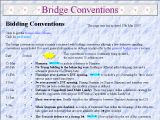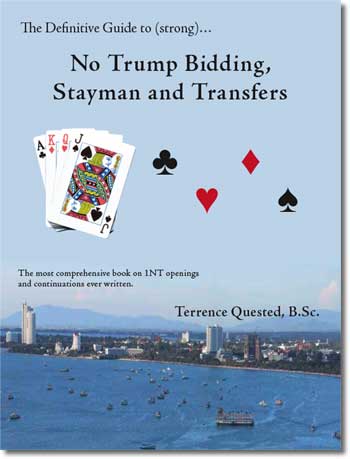Mon 3rd N-S 1st Guttorm &
E-W 1st Janne
& Hans 55% 2nd
Wed 5th N-S 1st Alain & Jean-Charles 67% 2nd
Lewis
&
E-W 1st Lars G & Bam Bam 63% 2nd Johan & Sigurd 57%
Fri 7th 1st Gerard & Terry 70% 2nd Lewis &
| to news-sheet main page |
 |
 |
|||
| to Pattaya Bridge home page |
|||||
 |
to bridge book reviews | to bridge conventions | to No Trump bidding | ||
| to bridge CD's and computer games and software | |||||
Bidding Quiz Standard
American bidding is assumed unless otherwise stated.
♠ 53 ♠ AK1062 (a) What do you open with Hand B? Suppose
you bid 1♠,
♥ A1096 ♥ K5 partner
bids 1NT and
♠ K4 ♠ A7
♥ 75 ♥ 94 With Hand D RHO opens 1NT and
you pass. LHO passes
♦ AK9854 ♦ 1074 and partner bids 2♣ (showing both majors). What do you
bid?
♠ Q86 ♠ A3 With Hand F you are
opener and this is the auction at love all:
♥ AJ9432 ♥ AQ76 1♦ 1♠ 2♥ 3♣
♦ J7 ♦ QJ97653 4♥ 5♣
♣ K6 ♣
- ?
What do you do? Pull
partner’s double or pass?
Bidding Sequence Quiz
G 1♠ pass 3♠ 3NT What
is 3NT? Natural (to play) or Unusual for the minors?
H 1♠ pass 1NT 2♣ Without
the 2♣ intervention, 2♦ would show a weakish
2♦ hand with 5-4 or 5-5
in the pointed suits. The question
is, does it have the same meaning after the 2♣ overcall or
is it a free bid showing strength?
J 1♦ pass 1♥ pass 2♣ is 4th
suit forcing, which this pair play as game forcing.
1♠ pass 2♣ pass What is 3NT, showing strength or showing
no slam interest?
3NT
K 1NT pass 2♥ pass 2♥ is a transfer, what
is 4NT? Quantitive or Blackwood?
2♠ pass 4NT
The Club Championships
|
|
Gold Cup = Best 30 |
Silver Plate = Best 10 |
Bronze Medal = Best 5 |
|
1 2 3 4 5 6 7 8 9 10 |
1873.1 Hans Vikman 1841.7 Dave Cutler 1833.7 1816.0 Lewis Berg 1804.6 Janne Roos 1799.2 Bob Pelletier 1782.5 Ivy Schlageter 1727.5 Jan v Koss |
672.7 Hans Vikman 663.6 661.8 Dave Cutler 661.1 Jeremy Watson 648.0 Lewis Berg 646.0 Lars Gustafsson 642.7 Ivy Schlageter 636.9 636.4 Janne Roos 636.1 Bob Pelletier |
347.2 Hans Vikman 342.3 Dave Cutler 341.1 Jeremy Watson 341.1 337.1 Lars Gustafsson 335.3 Ivy Schlageter 334.0 Lewis Berg 328.5 Derek & Gerard 327.4 326.2 Bob Pelletier |
Fast Arrival Board 7 from Monday 27th
Dealer: ♠ 6 West North East South
East ♥ 1097543 - - 1♦ pass
Love all ♦ K7 1♥ pass 1♠ pass
♣ Q1075 2♣ (1) pass 3NT (2) pass
pass (3) pass
♠ 1084 N ♠ AQJ5
♥ AKQJ2 W E ♥ 6 (1) 4th suit forcing, this pair play it as a game
force
♣ A6 ♣ K94 (3) This
West thinks that 3NT was fast arrival and
♠ K9732
♥ 8
♦ J86 What was your answer to sequence J in this week's quiz?
♣ J832
And what happened? East made 12 t
The bottom lines: -
- If you jump to game in a game
forcing auction; then most play that as fast arrival, showing little slam
interest.
Qui Culpa? Board
26 from Monday 3rd
E-W missed an easy (27 point!) game on this board at Table A, who would you
blame?
Dealer: ♠
985 Table
A
East ♥ AJ1086 West(B) North East South
both vul ♦ 8764 - - pass pass
♣ 8 1♠ (1) pass 1NT (2) 2♣
2♦ (3) pass 2♠ (4) pass
♠ AK1062 N ♠ Q7 pass (5) pass
♥ K5 W E ♥ Q9742
♣
A4 ♣
Q932 West(B) North East South
♠ J43 - - pass pass
♥
3
1NT pass 2♦ pass
♦ QJ9 2♥ pass 3NT all pass
♣ KJ10765
Table B: (1) ˝
of the field opened 1NT in answer to question B(a) and that looks very
reasonable (although it may be a slight underbid). The hand is reasonably
balanced, has a stopper in both doubletons, and opening 1NT solves any rebid
problem as experienced at Table A. The only reason that I can see not to open
1NT is that the hand is too strong (with great shape and two tens) and so 1♠ with a 2NT rebid in mind is probably best.
And what happened? E-W make 10 or 11 t
The bottom lines: -
- 17 points + two working tens
is worth an effort somewhere in the auction.
- And
the answer (Qui Culpa) - West
Inverted minors Board 29
from Monday 3rd
Raising partner’s minor suit
opening with a game-going hand can be a problem:
Dealer: ♠
J10632 basic bidding
North ♥ 1032 West(C) North East South
both vul ♦ - - pass 1♦ pass
♣ K6542 2♣ (1) pass 2NT (2) pass
3NT (3) all
pass
♠ K4 N ♠ Q9
♥ 75 W E ♥ AKJ9 playing
inverted minors
♣
A87 ♣ 103 West(C) North East South
♠ A875 - - 1♦ pass
♥
Q864 2♦ (1) pass 2♥ (4) pass
♦ 103 3NT all
pass
♣ QJ9
Inv minors (1) This
is the only real solution to question C – play inverted minors. This 2♦ bid shows invitational values or better (so
about 11+), denies a 4-card major and is forcing to 2NT or 3♦.
(4)
This
simply shows a ♥ stop.
(5)
With both
black suits stopped West bids 3NT to protect his ♠K and show game values.
And what happened? Despite my continual writing
about 3NT usually being better than 5♣/♦, no less than three pairs out of seven bid 5♦, the other 4 bid 3NT. 5♦ makes exactly but 3NT made +1 on three
occasions for the joint top.
The bottom lines: -
- Inverted minors really do
make life easy after a 1♣/♦ opening. When you have a good hand the level
is nice and low in order to establish that you have all suits stopped for 3NT.
Dave’s Column Here is Dave’s
input involving the play of the hand.
North South You are South,
declarer in 3NT and West leads the ♠J.
♠ A4 ♠ K6 East plays an encouraging card and you win with the ♠K.
♥ 63 ♥
AJ72 How do you play the ♣ suit for
four t
♦ 10642 ♦ AK75
♣ AK653 ♣ 1074
Dave’s Column
answer Board
3 from Wednesday 5th
Dealer: ♠ A4 West North East South
South ♥ 63 - - - 1NT
E-W vul ♦ 10642 pass 3NT all pass
♣ AK653
♠
J10975 N ♠
Q832 West leads the ♠J
to South’s ♠K, with East
♥ K109 W E ♥ Q854 signaling
encouragement. It is imperative for
♣
J982 ♣ Q play
the suit?
♠ K6
♥
AJ72
♦ AK75
♣ 1074
West East You are West, declarer
in 3NT after North has opened 2♥
♠
J108 ♠
AQ97 which partner doubled for take-out.
♥ KQ2 ♥ 74 North leads the ♥J, plan the play.
♣ Q63 ♣ AK42
Dave’s
2nd Column answer Board
1 from Wednesday 5th
Dealer: ♠ 52 West North East South
North ♥ AJ10985 - 2♥
Love all ♦ J92 2NT pass 3NT all
pass
♣ 85
North leads the ♥J, plan the play.
♣
Q63 ♣ AK42 This was fairly predictable and the best play is
♠ K643 for declarer to duck the first t
♥
63
establish his ♥ suit but he has no entry. Declarer
♦ Q108 will take three ♠’s, one ♥, two ♦’s and
three ♣’s.
♣ J1097
-
With a holding like AJ109(x)(x), lead the J
against NoTrumps, especially if the bidding indicates that dummy may be short
in the suit (and declarer probably holding the KQ).
Do not pre-empt
then bid again Board 9 from Friday 7th
Dealer: ♠ Q86 West North(E) East South
North ♥ AJ9432 - 2♥ (1) pass pass
E-W vul ♦ J7 2♠ (2) 3♥ (3) 3♠ 4♣ (4)
♣ K6 pass pass pass
♠ K10543 N ♠ A97 (1) What
did you open with this North hand E in
♥ K107 W E ♥ 85 this week’s quiz? It’s a bit too strong for
2♥ in
♣ 42 ♣ J987
reasonable suit and conforms with the
rule of 20.
♠ J2 (2) A bit light, but reasonable in the balancing
seat.
♥ Q6 (3) This is, of course, ridiculous. One should
never
♦ K1086 bid
again having pre-empted. Pass would have
♣ AQ1053 led to -2 and
that 200 would be a complete top for N-S.
(4) Apparently
meant as lead directional – he did not know partner had an opening hand and
assumed that E-W were going to bid game.
And what happened? South is a fine player of
the cards and managed to go just one down for -50 and about average. If West
had not bid then 2♥+1(170) would have been a near top for N-S, and
if North had not bid again then 2♠-2
(200) would have been a clear top for N-S.
The bottom lines: -
-
Do not bid
again having pre-empted.
-
More often
than not you undo the good work that the pre-empt did (as in this case).
-
Obey the
rule of 20 in 1st and 2nd seat.
A Lucky
misunderstanding Board 11 from
Wednesday 5th
E-W at table A lucked out on
this deal.
Dealer: ♠
10 Table
A
South ♥ Q532 West(A) North East South
Love all ♦ 862 - - - pass
♣ J9654 1NT (1) pass 2♥ pass
2♠ pass 4NT (2) pass
♠ 53 N ♠ AKJ872 pass (3) pass
♥ A1096 W E ♥ K
♣
A102 ♣ KQ3 West(A) North East South
♠ Q964 - - - pass
♥
J874 1♦ (1) pass 1♠ pass
♦ A75 1NT pass 4♠ pass
♣ 7 pass (4) pass
Table B: (1) It
looks like every other West simply added up to 14 and opened 1♦.
(4) I know of one West who had a long think here –
he knew he had a good hand but decided not to bid on because of the poor ♠’s. There would be no need to think if he had
opened 1NT.
And what happened? 4NT was a nice comfortable
contract that actually made +1. Virtually everybody else was in 4♠ which just makes exactly because of the two ♠ losers.
The bottom lines: -
-
Add on for
good 10’s and 9’s, especially if thinking about a 1NT opener.
-
After a
transfer is simply completed, then 4NT is quantitative, 4♣ is the ace ask.
-
I like to
play that 4♣ is RKCB for the transfer suit, but you would
have to agree this.
There is an article on the website that explains when 4♣ is Gerber and when 4NT is Blackwood or something else.
The director was called a number of times on Friday. Here are two of the
deals:
A Director call –
part 1 Board 23
from Friday 7th
Dealer: ♠
862 Table
A
South ♥ AJ West North East(D) South
Both vul ♦ AKQ5 - - - pass
♣ J1086 pass 1NT (1) pass pass
2♣ (2) pass pass (3) pass
♠ KQJ103 N ♠ A7
♥ K10875 W E ♥ 94
Table B
♣
4 ♣
AK9753 - - - pass
♠ 954 pass 1♦ (1) 2♣ 2♦ (4)
♥
Q632 2♥ (5) 3♦ (6) pass pass
♦ J963
♣ Q2
Table B: (1) This
pair play a weak NoTrump. I would open 1♣
but that’s just my style.
(4) Playing Acol South knows that North is unlikely
to have 4 ♥’s.
(5) This
is difficult for West; a responsive double may be best but 2♠ is certainly better than this 2♥ bid chosen.
(6) North
felt that 15 points needed another bid, but I would need another ♦.
(7) West
has got himself into a spot now and cannot show his ♠’s safely. So he made a nebulous double.
(8) After
some thought, East took the winning action of passing.
And what happened? The director was called at
the end of play at Table A with 2♣
making +1. The 2♣ bid had not been alerted and North pointed out
that they can make 2♦. However, East was
an inexperienced player and E-W had not agreed that 2♣ showed the majors, and even if the bid had
been alerted I cannot see how N-S can reach 2♦ (nobody in the room was allowed to play in 2♦). I think East’s pass of 2♣ is fine even
if he knew that 2♣ showed the majors and I cannot see that South can bid
anything. I let the result stand.
At Table B 3♦* went -1 for a perhaps undeserved top to E-W.
A Director call –
part 2 Board 14
from Friday 7th
This one was a
bit mor t
Dealer: ♠
95 West North East(F) South
East ♥ KJ5 - - 1♦ 1♠
Love all ♦ 4 2♥ (1) 3♣ 4♥ (2) 5♣
♣ AJ86543
5♥ all pass
♠ J764 N ♠ A3
♥ 1098432 W E ♥ AQ76
♣
K ♣
-
♠ KQ1082
♥
-
♦ K82
♣ Q10972
And what happened? South was unhappy with my
decision to let the bids stand. He has my sympathies, apart from the long pause
West made an appalling bid (double with a singleton trump). But West’s very
poor bidding is not the issue here, the issue is if East should pull the
double. I think he should, whether 75% of East’s peers would I don’t know.
Anyway, 5♥
went -1 for a good score to N-S. I guess that West’s declarer play is as bad as
his bidding as three players made 5♥ as
Deep Finesse says you should.
The bottom line:
-
Try not to
take a long time before bidding. In particular, problems are caused by a long
pause followed by a pass or a double.
-
The
partner of the long pauser must not take advantage of the unauthorized
information, and should only bid if it is very clear (75% of his peers would do
the same).
-
This one
is not totally obvious to me, but I would bid. As it turned out the innocent
side got a good score anyway.
Bidding Quiz Answers
Hand A: lNT. The ♥10,9
and the two other tens mean that this hand is worth upgrading to a strong
NoTrump.
Hand C: 2♣.
It’s horrible but the only reasonable bid unless you play inverted minors.
Playing inverted minors you bid 2♦
(forcing) and partner will tell you if he has a ♥ stop – what a great system!
Hand E: 1♥.
This hand is far too good for a weak two, especially when non-vul. It conforms
with the rule of 20 and 1♥ is clear to me. If
you do choose 2♥, then DO NOT bid again ‘to show a good 2♥ opener’.
Bidding Sequence Quiz Answers
G 1♠ pass 3♠ 3NT 3NT
is natural, to play. Usually with a ♠ stop and a long running minor.
H 1♠ pass 1NT 2♣ 2♦
shows no more than a minimum two-suited hand.
J 1♦ pass 1♥ pass 3NT
is fast arrival and expresses a desire to play there and
1♠ pass 2♣ pass not look for a ♥ fit or a slam.
K 1NT pass 2♥ pass 4NT
is quantitive, inviting 6NT or 6♠. If you want to ask for

